International technical support Newsletter No 17, December 2021
- Editorial
- PAS 2: launch of a new type of European international technical support project
- Assessment of the virtual regional workshops
- Three quarters of respondents are satisfied with the effectiveness of distance learning
- Interaction has been mostly maintained
- Expanding the audience while maintaining relevance
- Identifying new bilateral cooperation projects
- Participation in the 1st steering committee meeting for the Hakama 2 project
- Restart of the World Bank project for Russia
- The 115th issue of the Statéco review has just been released
- The workshop on the specifications of the future version of Eretes
- A summary of INSEE’s cooperation activities in the 2nd half of 2021
- Regional activities
- Sub-Saharan Africa
- The Maghreb and Mediterranean Basin
- Europe and Asia
- International technical support provided by INSEE: overview of actions completed in 2021
Editorial
As was the case last year from the start of the health crisis, almost all of INSEE’s international technical support activities during the past year were carried out remotely.
In this difficult context, the planned launch of the PAS 2 project (Pan African Statistics Programme) in early 2022, presented in the first article of this issue, will strengthen INSEE’s international technical support activity focused on Africa. INSEE will thus coordinate an initial European grant project relating to economic statistics and business registers in coordination with other European NSIs, and will participate in a second grant project coordinated by Statistics Denmark relating to social statistics, as well as in a major project led by Expertise France (service contract) within the framework of a consortium involving Afristat and other partners.
This issue also provides initial feedback on six subject-specific virtual regional workshops that have been organised by INSEE since November 2020: for this type of activity, we seem to have maintained interactivity and achieved our objectives. Next, the 1st steering committee meeting for the Hakama 2 project with Morocco is an opportunity to review the progress of the work carried out by INSEE in the framework of this three-year programme. Finally, INSEE’s participation in the project to strengthen statistical expertise in the Russian Federation, the new issue of the Statéco review and the workshop held in Senegal on the specifications of the future version of the Eretes national accounts tool are presented. This issue closes with an inventory of the activities carried out in the second half of 2021 and a review of the year’s actions.
Happy reading!
PAS 2: launch of a new type of European international technical support project

The Pan African Statistics Programme (PAS), funded by the European Union, aims to strengthen the statistical capacity of African NSIs. PAS 2 is a continuation of the first PAS programme to which INSEE contributed as part of a consortium led by Expertise France (2016–2021).
For the first time as part of the implementation of an international technical assistance programme, Eurostat has launched two calls for proposals on the grants model in addition to a traditional call for tenders won by the consortium led by Expertise France and to which INSEE contributes (as well as Afristat, the Economic and Statistical Observatory for Sub-Saharan Africa, GIZ, the German cooperation agency, DEVSTAT, Spanish service company specialized in statistics, and the Afrobarometer network).
This funding instrument, which is well known to European statisticians and supports many projects in the European Statistical System, had never been used in projects of this type, which are usually funded through a call for tenders that is open to private companies. This innovation is in response to a request made by European NSIs to be able to directly receive European funding for large international technical assistance projects.
INSEE is participating in two major grant projects, one of which it is coordinating
INSEE, together with four other European NSIs, will coordinate the first project, which will relate to economic statistics and company registers. In addition, together with four other NSIs (including INSEE), Statistics Denmark will coordinate the second project, which will relate to social statistics (see diagram below).
The two grant projects will start in March 2022 with an inception phase and the service agreement managed by Expertise France in early 2022, with both ending in 2025. The grants paid to the NSIs will fund support for the countries, while the activities organised as part of the project coordinated by Expertise France will have a regional scope.
A more partnership-focused instrument and strengthened discussions
By functioning in this way, the participating European NSIs will have greater responsibility in the management of the project. It entails working directly with the NSIs in the beneficiary countries within a partnership framework.
It will also provide an opportunity for discussions with Eurostat’s business directorates and to raise awareness of the issues facing statisticians in developing countries. Closer relations can also be established between the international cooperation departments of European NSIs, creating synergies in the actions carried out along with our traditional partners.
INSEE, which is also part of the consortium chosen to implement the service contract, will be well placed to establish synergies between it and the grant it is coordinating, as well as between the two grant projects in which it is participating.
Finally, the traditional geographical coverage of INSEE’s intervention could be extended, while organising discussions between the African partners of the consortium members (particularly between the linguistic communities).
Organisation of the two grant projects:
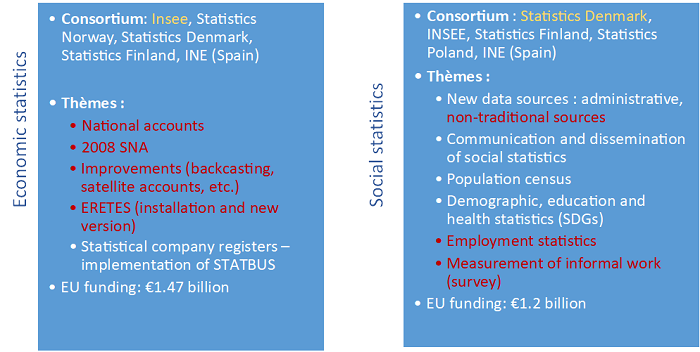
Forms of intervention:
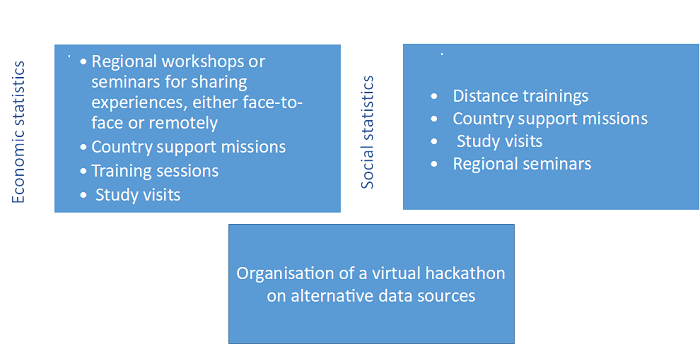
Assessment of the virtual regional workshops
The health crisis has shaken up the way we work, as it has in most sectors. Although remote working tools already existed, their use was very occasional and poorly controlled. The full shift to remote working – which is certainly rich in opportunities – has accelerated the use of these tools and has led to their improvement and to the emergence of new applications, new formats and new methods. The video-conferencing tools have thus enabled INSEE to continue its bilateral and multilateral technical support activities, in particular the organisation of subject-specific regional workshops.
INSEE organised six regional workshops, carried out via videoconference, between November 2020 and July 2021. These were sessions that traditionally take place on site, either at INSEE’s premises or at those of a partner NSI. The completion of these sessions remotely due to the health crisis allowed for wider participation by the staff of NSIs, as well as the diversification of audiences. Indeed, more countries were able to join the workshops, where financial and logistical circumstances would make provision for only a limited number of participants (usually two representatives per country) on site. These workshops were organised in coordination with the three Maghreb NSIs (Algeria, Morocco and Tunisia) and were also open to participants from other countries. The NSIs of Lebanon and Serbia, as well as Afristat, the Centre de formation et de perfectionnement en statistiques du Mali (Mali Statistical Training and Expertise Centre), the Bank of Lebanon and the Central Bank of West African States participated in one or more of these workshops. The topics covered are presented in the table below.
| Workshop | Subject areas | Number of participants | Countries or institutions represented |
|---|---|---|---|
| Macroeconomic forecasting models | The models: - Mésange and Avionic (INSEE) - ThoR (Directorate-General of the Treasury) - ThreeME (French Economic Observatory, OFCE) - FRBDF (Banque de France) Discussions on the construction of a model |
15 | Bank of Lebanon HCP Morocco Statistics Tunisia SORS Serbia |
| Employment statistics | - Employment area construction method - Discrimination measurement (DARES) - Module B of the Labour Force Survey - Statistical system on salaries |
10 | HCP Morocco Statistics Tunisia NSO Algeria |
| Mixed-mode data collection and telephone surveys | - Strategy to develop mixed-mode data collection and active metadata - Survey on the impact of Covid-19 on Tunisian households (NSI Tunisia) - Outlook survey on the effects of Covid-19 on the activity of Moroccan companies (HCP) - Labour Force Survey - Acemo-Covid Survey (DARES/INSEE) - Mode effects - Discussions on the outlooks for NSIs |
22 | NSO Algeria HCP Morocco Statistics Tunisia |
| Commuting between home and work | - Population census data - Experiences in Morocco (HCP) - Zoning into functional areas - Modes of transport used - Personal Mobility Survey |
35 | CAS Lebanon HCP Morocco Statistics Tunisia SORS Serbia |
| The Sustainable Development Goals | - Dashboard of indicators for monitoring the SDGs in France - Discussion of NSI experiences - Issues at international level |
17 | NSO Algeria HCP Morocco Statistics Tunisia |
| Big data, approaches and experiments | - The SSP Lab and forms of collaboration - Platform approaches to experimenting with data science - Media sentiment and textual analysis - Elements of machine learning to understand the region |
28 | Afristat BCEAO CFP-Stat Mali HCP Morocco Statistics Tunisia |
The assessment of these workshops provides initial feedback with almost 60 respondents in total.
Three quarters of respondents are satisfied with the effectiveness of distance learning
The workshops were held on Zoom, which 96% of the respondents say was easy to use. Almost half (46%) say that a video conferencing system is as effective as being on site for this type of activity, while a fifth say it is less effective. One in five respondents believes that the methods are complementary.
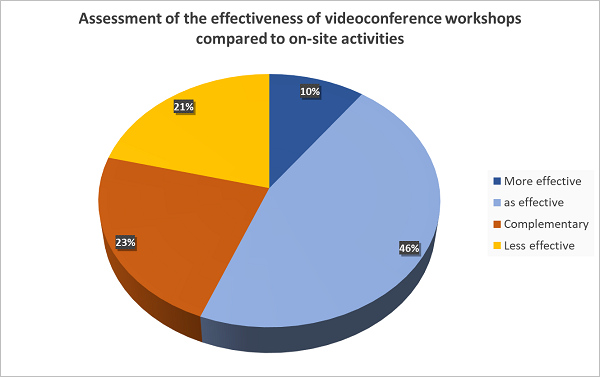
Interaction has been mostly maintained
One of the challenges of working remotely is that of maintaining the richness of interactions when they might be less spontaneous than in an on-site meeting. Those leading the videoconference sessions have an important role to play. Sub-optimal technical conditions can sometimes hamper interaction between participants. Ultimately, interaction was mostly maintained, as it was declared good in 72% of cases and average in the remaining 28%.
Expanding the audience while maintaining relevance
The usefulness of the workshops and their applicability to the work of the participants is a crucial indicator. The average of this indicator for all workshops is 3.8 out of 5 (workshop by workshop, the averages range from 2.75 to 4.2). It should be borne in mind that opening up the workshops to a wider audience carries the risk that the content may not necessarily be relevant to all participants. The use of Zoom has allowed certain activities to be shared between the different partners, using the interpretation functions where necessary. Almost two-thirds (63%) of English-speaking respondents said that the presentations, although quite technical in nature, were very easy to follow thanks to the simultaneous interpretation. The remaining third said that it was quite easy. These results are encouraging regarding the possibility of opening our workshops up to a multi-language audience.
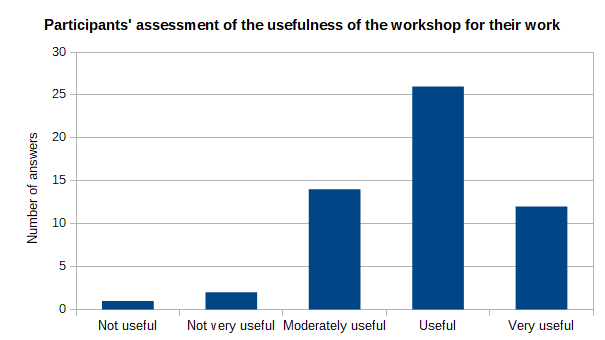
Identifying new bilateral cooperation projects
The general framework presented in the regional workshops may lead to new requests for cooperation, in order to provide technical support for the implementation of concrete actions. The assessment of the activities thus made it possible to ascertain specific needs, such as the implementation of mixed-mode data collection in a household outlook survey, the creation of a medium-term macro-econometric forecasting model or the exploration of probabilistic matching methods for geolocation.
Participation in the 1st steering committee meeting for the Hakama 2 project
INSEE participated in the first steering committee meeting of the Hakama 2 project with Morocco (presented in our previous newsletter), which took place in Rabat on 12 November 2021. It was an opportunity to take stock of the progress of the work of the different components of the project, to outline the elements of the 2022 action plan and to identify possible links between the different components. Thus, an exchange of experiences could be organised between the High Commission for Planning of Morocco and the experts in charge of component 2, based on the subject of digitalisation (a component for which the project works with other Moroccan administrations), in relation to which the HCP is currently carrying out a major project.
Work has not progressed at the same rate in relation to all components. INSEE’s work to develop the capabilities of the HCP has been carried out at a steady rate and this is one of the areas in which the most progress has been made.
Thus, 27 technical meetings were organised (all carried out remotely) on all three subjects coordinated by INSEE during the past year, in addition to four coordination meetings with the HCP and the Expertise France project team in Rabat. These activities resulted in 96 days of expertise, which is 83% of the number of days planned for the current year.
2021 can be seen as a year for scoping and preparation. INSEE discussed its experience in the various project areas (see detailed description in Newsletter No 16) and organised training sessions. The HCP has drafted notes analysing the situation and defining its projects in the three subject areas, etc.
2022 will be a year of operationalization. INSEE will support the deployment of pilot projects relating to the various components: organisation of a pilot survey in the Oriental regional directorate (Oujda), testing of a user satisfaction survey, introduction of a pilot version of the overhauled structural business survey and experimentation with the use of the mixed-mode data collection for a household survey. These exercises, which will require face-to-face discussions, will be assessed before their full-scale deployment (planned for 2023).
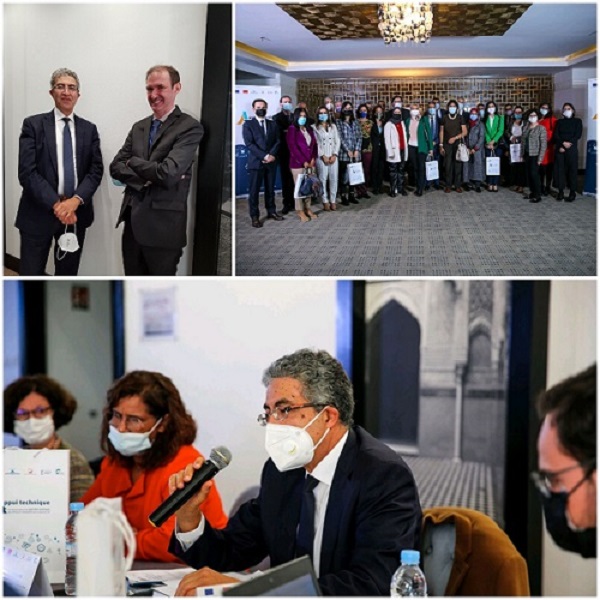
Steering Committee meeting for the Hakama 2 project on 12 November: top left, Mr Mohammed
Bircharef,
Director General of Statistics and National Accounts at the HCP and
Mr Francis Lemoine of the European Union Delegation
Top right, all participants of the Steering Committee meeting
Below: Mr Mohammed Bircharef speaking during the Steering Committee meeting
Restart of the World Bank project for Russia
The “Strengthening statistical expertise in the Russian Federation” project was launched in 2016. This is a project funded by the World Bank and led by Statistics Denmark. INSEE is a member of the consortium responsible for carrying out the project, along with the German, Finnish, Italian and Dutch NSIs.
The objective of the project is to help the Russian Federal State Statistics Service (Ouvrir dans un nouvel ongletRosstat) in becoming a “centre of excellence” to enable it to provide technical support to the governmental statistical services of the other members of the Commonwealth of Independent States (Azerbaijan, Armenia, Belarus, Kazakhstan, Kyrgyzstan, Moldova, Tajikistan, Turkmenistan and Uzbekistan).
Due to the Covid-19 pandemic, no action could be taken in 2020. The project, which was due to end in June 2021, has therefore been extended until June 2023. It resumed in 2021 with the introduction of virtual activities instead of the originally planned missions. The first action related to input-output tables (IOTs); the second related to the profiling of company groups and how to deal with it in national accounts; and the third related to the development of environmental accounts. Each of these actions was carried out by a pair of experts from the NSIs in the consortium. INSEE took part in the first two missions, in tandem with a Finnish expert for the action relating to the IOTs (3 days of activities) and with a Danish expert for the action relating to profiling (4 half days of activities).
The 115th issue of the Statéco review has just been released
The new issue of the methodological review Statéco includes seven articles on statistical methodology and economic analysis in relation to developing countries, written by French, African and Maghreb authors: statistical processing methods applied to sub-Saharan Africa (articles on VAR models and seasonal adjustment); analysis of the Moroccan economy over a long period; a quantitative socio-anthropological study on indigenous self-declaration in the population census in Mexico; an INSEE survey on the informal work sector in Mayotte; INSEE support for the establishment of a company register in Palestine; and finally, transformations of the international technical support carried out by INSEE over the last decade.
The issue is available online here.
The workshop on the specifications of the future version of Eretes
Ouvrir dans un nouvel ongletEretes, a system for helping with the compilation of national accounts, designed and developed
in the early 1990s, has been rolled out in Africa, primarily in the French-speaking
countries.
In recent years, the International Technical Support Division, which is responsible
for monitoring and developing the tool, has embarked on a process of overhauling the
system (technological innovations and added functions).
An initial phase of the project, as part of Pan African Statistics Programme 1 (Ouvrir dans un nouvel ongletPAS 1, in 2016–2021, preceding PAS 2 presented in the first article of this Newsletter), consisted of a broad consultation of users in order to identify their needs and areas for improvement. In particular, this phase saw the organisation of two dedicated workshops in March 2017 in Abidjan and December 2018 in Bamako, each bringing together around ten expert users of the tool.
On the basis of the recommendations made, the Eretes technical team drafted detailed specifications for the improvements by integrating the new methodological areas identified by the experts: a backcasting module, balance sheets and automatic computing of the supply and use balances.
A workshop was organised at ENSAE in Dakar from 6 to 9 December 2021, in order to validate these specifications with the same expert users of the tool from 6 countries and with wider participation of national accountants from the National Agency for Statistics and Demography of Senegal (Ouvrir dans un nouvel ongletANSD). The IT developments will start in 2022 within the framework of the PAS 2 grant awarded to INSEE by Eurostat, for the implementation of activities in the field of national accounts.
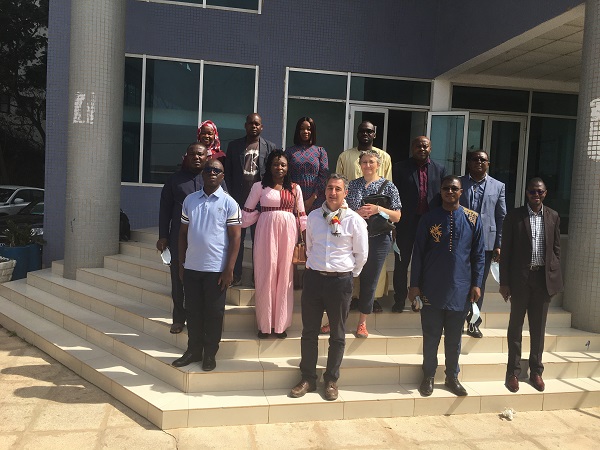
The participants at the workshop organised in Dakar from 6 to 9 December 2021
A summary of INSEE’s cooperation activities in the 2nd half of 2021
Regional activities
-
NSIS OF ALGERIA, MOROCCO AND TUNISIA, AFRISTAT AND THE CENTRAL BANK OF WEST AFRICAN
STATES
BIG DATA – approach and experiments
Organisation of a discussion workshop
Videoconference
July
-
STATAFRIC, AFRICAN DEVELOPMENT BANK, UNECA
Participation in regional webinars on national accounts
- Presentation of the Nadabas software, Statafric webinar
- The 2021 round of ICP Africa,, African Development Bank webinar
- Preparation of the 2025 SNA, UNECA webinar
Webinars
September/November
-
SUB-SAHARAN AFRICA AND THE MAGHREB
Validation of the future functions of Eretes
Technical workshop, Dakar (Senegal)
December
Sub-Saharan Africa
-
INSEE - AFRISTAT
Resilience, challenges and opportunities for official statistics in the context of the health crisis
Videoconference for Directors-General and high-level executives of the NSIs of French-speaking countries in sub-Saharan Africa and the Maghreb
Panel with the Secretary-General of the Moroccan High Commission for Planning and the Directors-General of the Cameroon NSI, Afristat and INSEE
July
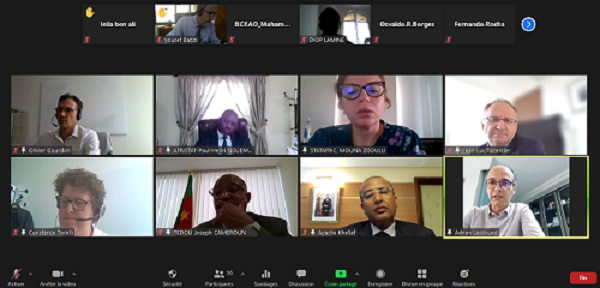
From top to bottom and from left to right: Youcef Bazizi (DG of the NSO Algéria),
Lamine Diop (CESD),
Olivier Gourdon (INSEE), Paul-Henri Nguema Meye (DG of Afristat), Mouna Zgoulli
(moderator, Statafric), Jean-Luc Tavernier (DG of INSEE), Constance Torelli (INSEE),
Joseph Tedou
(DG of the INS of Cameroon), Ayache Khellaf (SG of HCP of Morocco), Adnen Lassoued
(DG of INS of Tunisia)
-
Ouvrir dans un nouvel ongletDATAFID PROJECT
Participation in the launch of the regional project to support the strengthening of digital economy statistics and the use of data science by tax and customs authorities
Funding from the Directorate-General of the Treasury for Sub-Saharan African countries and Afristat
Visit, Paris
October
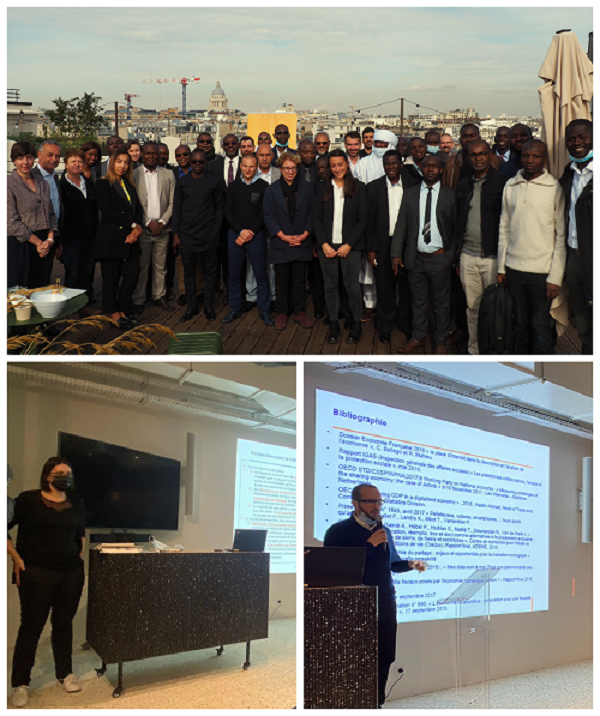
The participants at the launch of the Datafid project, Cindy Duc and Alexandre Bourgeois (INSEE)
-
CÔTE D’IVOIRE
Presentation of the National Directory for the Identification of Natural Persons (répertoire national d’identification des personnes physiques - RNIPP).
With Civipol
Visit, Paris
October
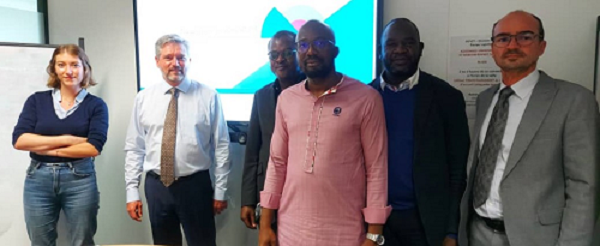
From left to right: Clara Pinaud, (Civipol), Lionel Espinasse (INSEE), Eric Dogbo,
Jean-Charles Akie,
Ibrahim Coulibaly (National Civil Status and Identification Office of Côte d’Ivoire),
Arnaud Blanchard (Civipol)
-
AFRISTAT
Participation in the National Accounting Association (Association de comptabilité nationale ACN) conference
Visit, Paris
November
-
MALI
Training in handling the anonymisation of personal data
Visit/training, Paris
November
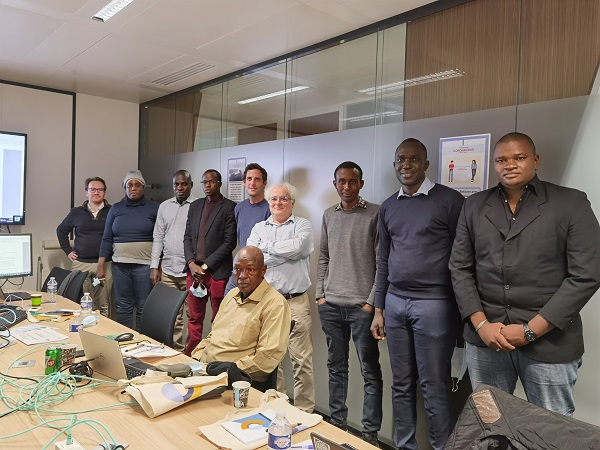
From left to right: Julien Jamme (INSEE), Aminata Keita, Seydou Konare, Gaston Sodio
(Instat),
Clément Guillo (INSEE), Dominique Blum (consultant), Modibo Ba, Oumar Sidibe,
Abdoulay Boundy (Instat) ; in front, Amadou Tall (Instat, delegation leader)
The Maghreb and Mediterranean Basin
-
THE MAGHREB
The dashboard of indicators for monitoring the sustainable development goals in France and issues at international level
NSIs of Algeria, Morocco and Tunisia
Videoconference
July
-
ALGERIA
Setting up an agricultural statistics database
Modernisation and development of the database submitted by the Ministry of Agriculture
Videoconference and remote discussions
July – September
-
MOROCCO
Hakama II Project
A three-year project to develop the capabilities of the High Commission for Planning: technical capacity building of external services, implementation of mixed-mode surveys and redesign of the business statistics production system
Videoconference, remote discussions and missions
July – December

Macro-econometric model of the National Institute for Economic Analysis
Validation of the Model
Remote discussions
October – December
-
TUNISIA
“New database” project
Change to the national accounts database and alignment with the 2008 SNA: expert assessment of the switch to the 2015 database, procedure for drawing up financial accounts, communication system assessment and prospects
Missions
November
Europe and Asia
-
RUSSIA
National accounts
Presentations alongside a Finnish expert in the production of symmetrical input-output tables – World Bank project
Videoconferences
September
Business Statistics
Presentations alongside a Danish expert in the profiling of company groups
Videoconferences
September
- STATISTICS THROUGH EASTERN PARTNERSHIP (STEP)

Coordination of the Official Statistical Service
Workshop to share good practices and experiences in organising and planning statistical
systems activities
Videoconference
September
-
UKRAINE
Price indices
Presentation on the calculation of Services Producer Price Indices (SPPIs)
Videoconferences
October
Interview with Mykhailo Fedorov, Deputy Prime Minister and Minister of Digital Transformation
of Ukraine, with the Director-General of INSEE
Visit, Paris
October
International technical support provided by INSEE: overview of actions completed in 2021
tableauTableau 1 – Number of cooperation actions
| Type of funding | Nomber |
|---|---|
| Bilatéral | 46 |
| Multilatéral | 51 |
| Total | 97 |
tableauTableau 2 – Corresponding number of days of expertise
| Type of action | In-person | Remote | Total |
|---|---|---|---|
| Missions (including video missions) | 18 | 171 | 189 |
| Visits (including video visits) | 6 | 9 | 15 |
| Workshops, webinars and training | 0 | 48,5 | 48,5 |
| Remote discussions | 0 | 14,5 | 14,5 |
| Total | 24 | 243 | 267 |
tableauTableau 3 – Number of experts involved
| Origin of experts | Missions (including via video) | Visits (including via video) | Workshops, webinars and training | Remote discussions |
|---|---|---|---|---|
| Active at INSEE | 25 | 11 | 33 | 4 |
| Active outside of INSEE | 3 | 1 | 2 | 0 |
| Retired INSEE staff | 2 | 0 | 3 | 1 |
| Total | 30 | 12 | 38 | 5 |
Video mission: a videoconference replacing discussions held during an expertise mission on the premises of the partner institution (one partner only)
Video visit: a videoconference replacing a visit by the partners to INSEE’s premises (one or more partners)
Remote discussions: exchanges of emails and documents


